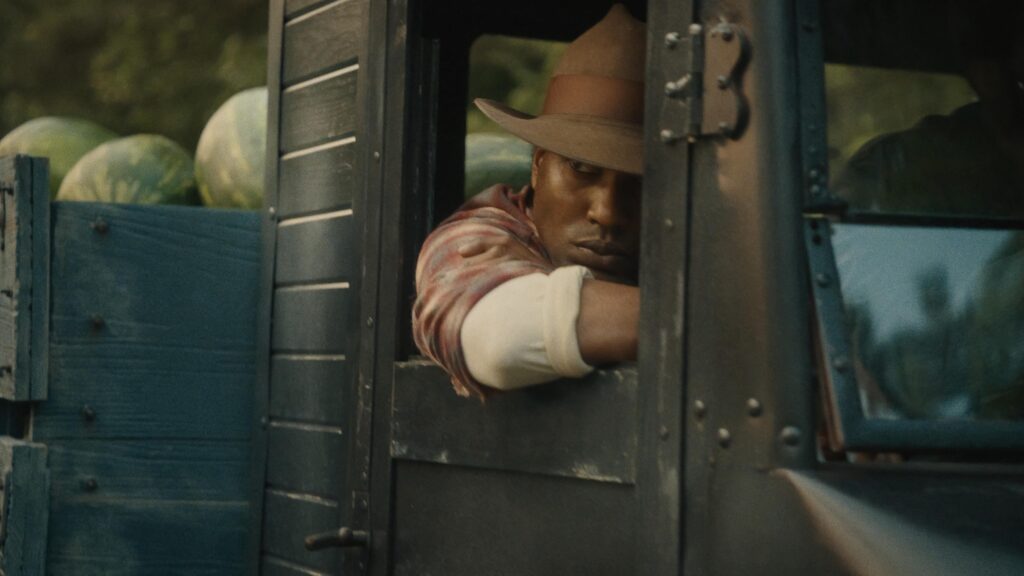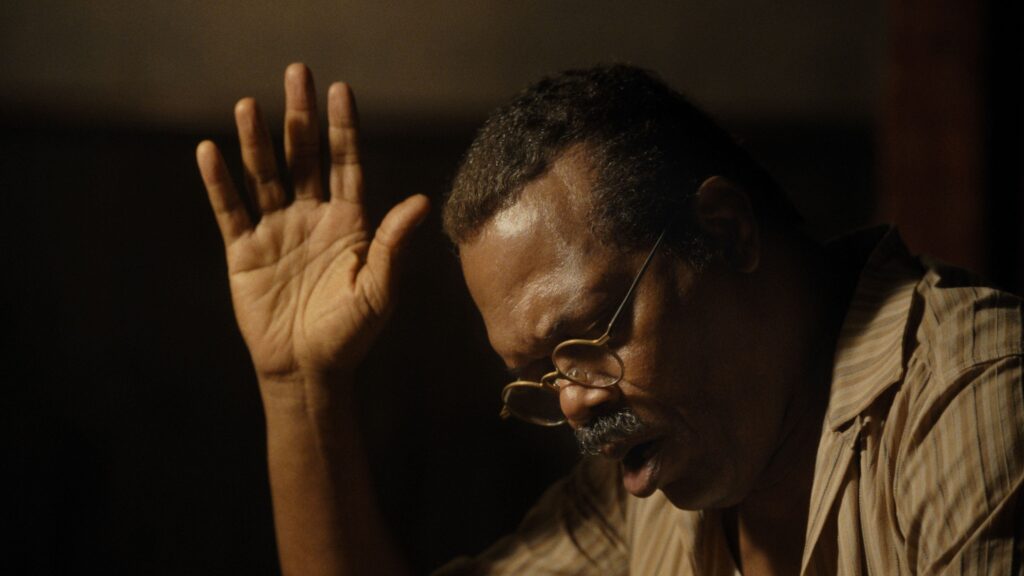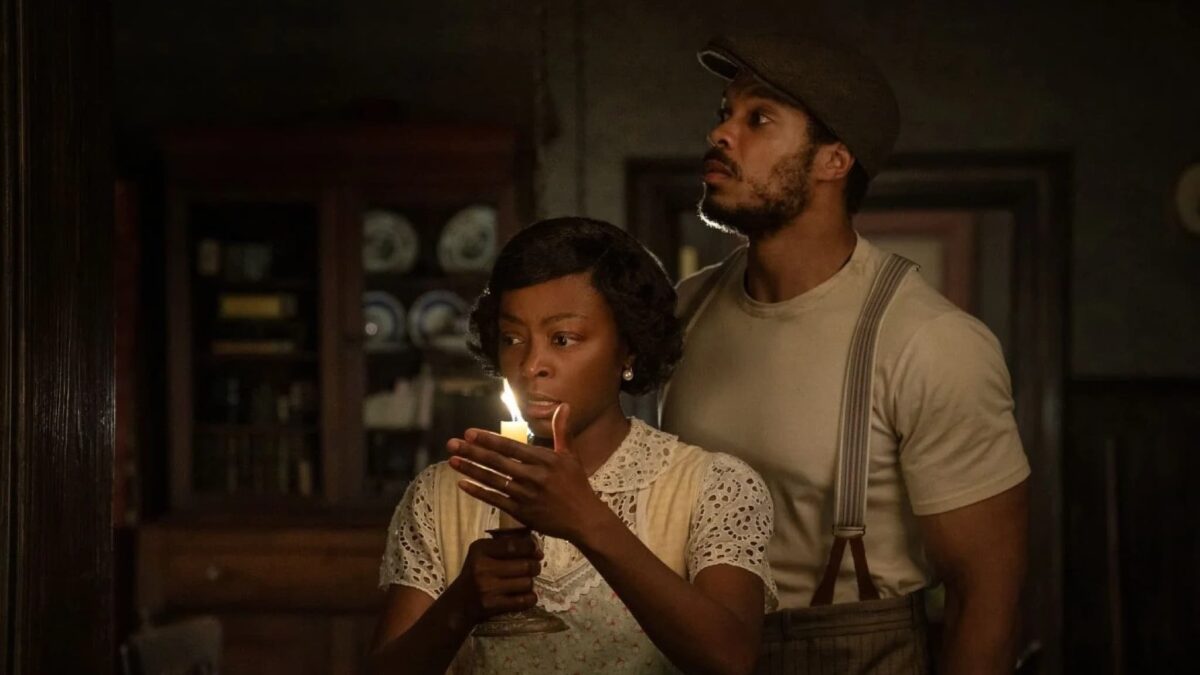Born to a time of fire
Even if you didn’t know it in advance, you can guess that The Piano Lesson is a play adapted for the screen. The story is broken into large scene chunks involving three-to-five characters talking for three-to-five mintues. Despite the addition of flashback material and connective tissue between scenes, it is paced like a two-act stage play. Concepts clearly designed around the abstraction and ambiguity of the stage — in particular, the presence of a “ghost” — are rendered too literally on screen. Behind a rookie nepo baby director, Denzel Washington’s son Malcolm Washington, The Piano Lesson never threatens to transcend its roots.
But damn if The Piano Lesson isn’t a solid adaptation, buoyed by a great play script at its core. The acting is excellent, the production is impressive, and Malcolm Washington acquits himself with some functional, moody staging. The result is occasionally stodgy, but every so often, a dialogue exchange or performance moment in The Piano Lesson wallops you across the face. The play script is just too rich, the cast too talented, for it not to.
The Piano Lesson is the third of a planned ten films produced by Denzel Washington based on famed playwright August Wilson’s series of plays called The Pittsburgh Cycle. It follows Fences in 2016 and Ma Rainey’s Black Bottom in 2020. Wilson’s plays probe elements of the Black American experience across a hundred years and netted Wilson two Pulitzers. Washington has done the film community and American culture more broadly a service in creating prominent adaptations of these plays, which I was not familiar with at all before his adaptation project began.

The story takes place in the 1930s in Pittsburgh against the backdrop of the Great Depression. Boy Willie (John David Washington) and Berniece (Danielle Deadwyler) are siblings, the children of Boy Charles (mostly offscreen, but played by Stephan James in flashbacks). Their father stole a beautiful and valuable piano made by a slave craftsman from his family’s ex-slavers, but he died in a later act of retribution. The Piano Lesson shows Boy Willie and Berniece struggling to decide what to do with the piano years after that violence.
That the piano is a metaphor for the dark and complicated legacy of slavery in Black culture and economic standing is obvious, almost too obvious. But it works. What makes it affecting is how that symbol ripples out into diverging views on reckoning and responding to the troubled past, rendered with indelible character drama.
The story is tinged with magical realism as the ghosts of slave owners haunt Berniece’s house. (As if the scenario wasn’t metaphorical enough…) This is one area where The Piano Lesson did not particularly impress me as an adaptation, but I’m not really sure what Malcolm Washington could have done. The premise really is a relic of something that works better on stage, where you can imagine the ghost in the room with you but contained within your imagination. Washington’s depiction struggles with rendering this in a satisfying way.

Much of the cast reprises their roles from a stage production of the play, for better and worse. John David Washington is terrifically magnetic but also very loud as one of the leads. It’s easy to imagine Washington controlling a physical stage, but on screen it’s discordant. But in general, the sheer talent and charm of the cast is buoyant. Samuel L. Jackson reminds us that he’s not just Nick Fury with a low-key, observing turn. The two best in show are Deadwyler and Ray Fisher as Boy Willie’s sidekick Lymon. Deadwyler in particular offers one of the most impressive performances of the year, capturing an uneasy balance of emotions while sparking with everyone else in the cast.
The Piano Lesson had Oscar buzz early in the year, but seems unlikely to snag even a nomination at this point. Part of that is because of the uneven translation from stage to screen, but part of that is just that Hollywood knows what it’s getting with these August Wilson adaptations at this point. I’m trying not to take it for granted. The Piano Lesson isn’t one of the year’s great films, but it has some really glorious moments in it, and I’ll keep watching this series as long as Denzel and co. keep making them.
Is It Good?
Good (5/8)
Dan is the founder and head critic of The Goods. Follow Dan on Letterboxd. Join the Discord for updates and discussion.

